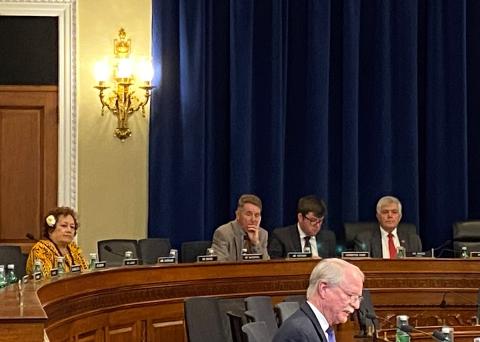Subcommittee Examines Amata’s South Pacific Tuna Treaty Act
Washington, D.C. – Congresswoman Uifa’atali Amata took part in the examination of a bill she sponsored, with Congressman Ed Case (D-HI) as the original cosponsor, the South Pacific Tuna Treaty Act, H.R. 1792, a bipartisan effort to congressionally direct full implementation of the South Pacific Tuna Treaty, as negotiated among the U.S. and Pacific nations.
The bill amends the South Pacific Tuna Treaty Act of 1988 to reflect amendments to the Treaty adopted in 2016 and to which the Senate provided overwhelming bipartisan support for advice and consent to ratification in 2022. Thursday’s legislative hearing by the Natural Resource Committee’s Subcommittee on Water, Wildlife, and Fisheries is a key step to advancing the bill. Congresswoman Amata highlighted the support of local fishermen to the Subcommittee and submitted their letter to the official record of the hearing.

Congresswoman Amata in a hearing examining her Tuna Treaty Act
“Congress takes seriously its roles of oversight, and directing this full implementation of U.S. tuna agreements in the Pacific to the benefit of our fleet,” said Congresswoman Amata. “I appreciate this important testimony, and the letter of support, once again clarifying the unnecessarily onerous challenges facing U.S. tuna production, despite its value as a healthy and traditionally affordable food source, and the fleet’s value to food security priorities.”
Testifying was William Gibbons-Fly, Executive Director, American Tunaboat Association. He noted that those owning and operating the U.S. flag tuna purse seine vessels in the Pacific Ocean under the South Pacific Tuna Treaty, are the last true “distant water fishing fleet” under the U.S. flag, describing them as “multi-generational, family-owned businesses with along and storied history as an important part of the U.S. fishing industry.”
“Passage of the amendments in H.R. 1792 is vitally important for the U.S. fleet,”
testified Mr. Gibbons-Fly. “The 2016 amendments to the Treaty represent years of hard-fought negotiations to improve the operational conditions and flexibility for the fleet, some of which can only be realized after the necessary amendments to the implementing legislation are in place.”
He continued, “The governments that are party to the Treaty, including the United States, have been applying many of the Treaty amendments provisionally under a Memorandum of Understanding adopted concurrently with the amendments themselves. However, in the absence of U.S. amendments to the implementing legislation, key provisions of the domestic regulatory regime continue to reflect aspects of the Treaty prior to the 2016 amendments being adopted. As a result, since 2017 the fleet has been operating in a kind of ‘limbo,’ with conflicts between certain operational conditions in the amended Treaty, and those reflected under the domestic regulatory regime.”
He cited the 2016 removal of the definition of “Treaty area” and modifications to “Licensing Area” that under the 2016 agreement would allow U.S. fishing in high seas areas but are still restricted due to the law’s outdated wording. “H.R. 1792 resolves this and other conflicts and its passage will provide the fleet with greater operational flexibility, clarity and security,” he said.
The U.S. tuna purse seine fleet has been rapidly reduced in just a few years from 34 vessels to 13 vessels, facing increased regulation, reduced access, and more competition especially from Illegal, Unreported and Unregulated (IUU) fishing.
Gibbons-Fly stated that “maintaining an active and viable U.S. tuna purse seine fleet operating under the Treaty in the strategically important central Pacific Ocean is a critical counterbalance to China’s growing influence across the region.”
###